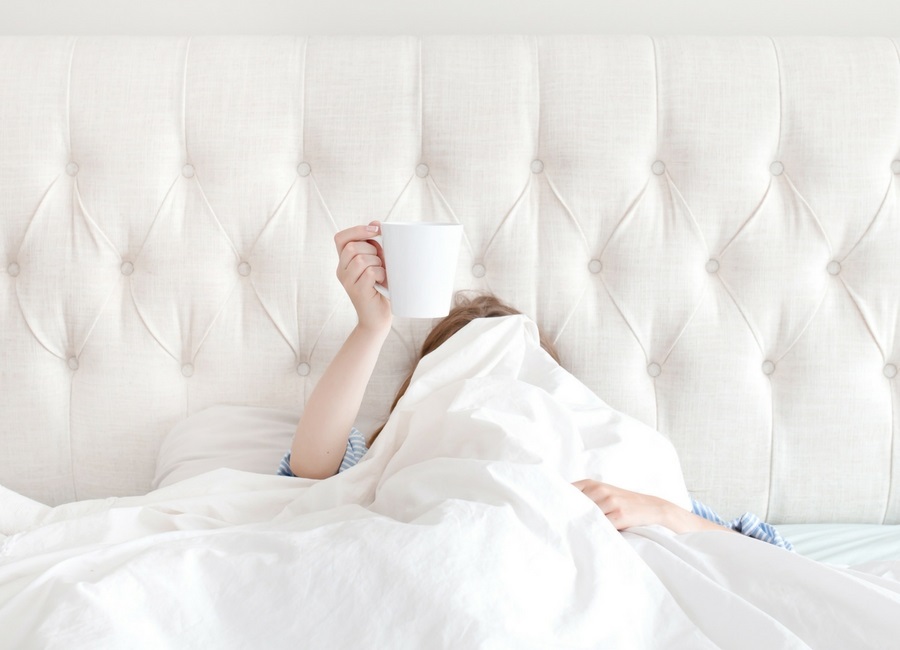We don’t think you understand the power of a good night’s sleep. Getting enough rest will increase your happiness, productivity, and improve your ability to make smart decisions in tough situations. When you don’t let your body and mind rest like it should, there are studies that show it does affect the way you work and perform while awake. Not having a good night’s sleep can make you cranky and eventually lead to severe health risks. If you haven’t been getting good sleep, it could be your habits. I’m sharing 7 bad habits ruining sleep, so you can make some adjustments.
Eating Late
Sometimes staying late in the office can result in us having to eat dinner closer to our bed time than we’d like. Although it’s not ideal to eat a meal of any size right before you go to sleep, try substituting something small and filling instead of a large meal. You should also consider consuming a protein shake. When you eat a huge meal before going to sleep, your digestive system is working on breaking down the food which can keep you up at night. Eating earlier in the day can help mitigate any acid reflux you might encounter, which usually keeps people up at night.
Not Working Out
In many cases, our body still has a lot of energy that needs to be released and if we don’t get that energy out, it can cause us to toss and turn all night. Morning or afternoon workouts are great for increasing a person’s quality amount of sleep. Of course, staying active won’t be your only solution to getting a better night’s rest, but it is a step in the right direction. Working out is good for a multiple of reasons. It helps you stay healthy, in shape, and most of all, it gets rid of any excessive energy you might have that prevents you from knocking out at bed time.
Drinking too much coffee in the evening
Caffeine in the morning is certainly fine for a daily pick-me-up. However, consuming it all day, especially in the evenings, is a recipe for sleep disaster. Drinking coffee gives you some energy for a short period of time, but it eventually wears off and you’re left feeling empty and burned out. If you consume coffee late in the evening, it can take anywhere from 4-6 hours to wear off depending your daily consumption. The next time you’re contemplating picking up an afternoon cup of joe take into consideration what time you will be going to bed.
Scanning your mobile device before bed
We all do it – scroll through our social feeds before hitting the hay. It’s one of the main reasons we don’t get enough sleep at night, and causes us to wake up feeling restless and annoyed. Every smartphone has an LED light that is also called a blue light. The LED light in most phones have been shown to cause damage to your vision and suppress the production of melatonin, which is a hormone that is useful in regulating the sleep cycle. It’s tough enough to put your phone down during the day, so try your best to not let it consume you prior to you going to sleep.
Working in bed
Having the luxury of working in bed isn’t so much of a luxury when your sleep gets cut in half. Similar to your phone, the light from your laptop can interfere with you getting a good night’s sleep because your brain isn’t able to release the melatonin to let you unwind before bed. Working in your bed may seem like a good idea, but it actually isn’t. Be sure when you get in bed that it’s time to settle down and not jump right back into work. Even though you may appear comfortable, your brain is still in work mode and you’re not going to get the full amount of sleep your body needs.
Sleeping in on weekends
Of course, your weekend sleeping schedule is going to be a lot different than your sleep schedule during the week. Many times, we take advantage of sleeping in, which causes us to sleep in too late and wake up feeling more tired than normal. Try not to sleep in too late for a number of reasons; the most important is because you don’t want to throw your body off.
Our bodies tend to be on a clock cycle that keeps us on track. Drastically changing your sleep schedule on the weekends can cause a mild jet lag sensation. It’s important to keep a consistent sleep schedule, even during the weekends to avoid those negative effects.
Consuming alcohol before bed
Whether it’s a birthday party during the week or the office having happy hour, consuming alcohol before you go to sleep can decrease the amount of sleep you actually get. In many cases, one drink won’t really affect your sleep but if numerous drinks are consumed, you will definitely feel it the next day. We often get the impression that a night cap will help us get a good night’s rest.
It certainly does act like a sedative at the beginning, but eventually leads to less sleep during the night. It’s great to have a couple of drinks and enjoy yourself, but be sure to drink responsibly because your health is just as important. Drinking alcoholic beverages before going to bed interferes with our REM sleep, which is a deep sleep that lets our brain rest for the night.
Getting your rest is extremely important, and sometimes we don’t realize it until it’s too late. Be sure to get enough rest during the week, as well as the weekends. Our bodies need to charge and if we deprive it from sleep, then we aren’t able to work to our full capacity. What things keep you from getting sleep? Have you found solutions to making sure your body gets enough rest? Check us out on Facebook, and don’t forget to like and comment. We also, love staying connected with members through IG and Twitter @citygirlsavings.





